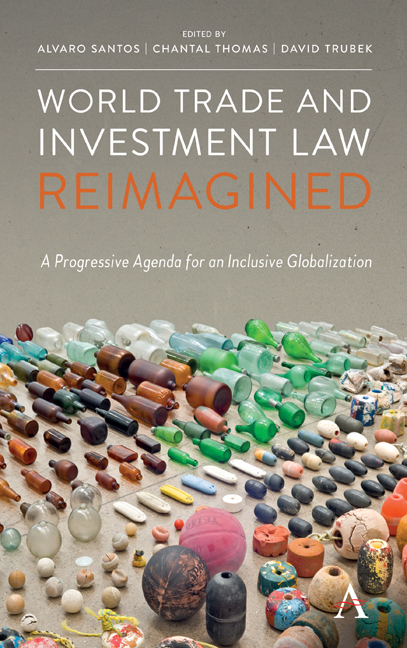Book contents
- Frontmatter
- Contents
- Acknowledgments
- List of Contributors
- Introduction World Trade and Investment Law in a Time of Crisis: Distribution, Development and Social Protection
- PART I RETHINKING THE POLITICAL ECONOMY OF TRADE: COMMENTS ON DANI RODRIK'S STRAIGHT TALK ON TRADE
- PART II SETTING THE STAGE FOR A PROGRESSIVE VISION: EMERGING ISSUES IN WORLD TRADE AND INVESTMENT LAW
- SECTION 1 MAPPING THE NEW CONTEXT FOR TRADE AND INVESTMENT LAW
- SECTION 2 DEALING WITH MAJOR CHANGES IN THE WORLD ECONOMY
- SECTION 3 FRAMING A MORE EQUITABLE INVESTMENT LAW REGIME
- SECTION 4 SUPPORTING DEVELOPMENT
- SECTION 5 REINFORCING SOCIAL PROTECTION: SPREADING THE BENEFITS OF TRADE, DEALING WITH LOSSES AND EXPLORING THE TRADE–IMMIGRATION NEXUS
- Index
Introduction World Trade and Investment Law in a Time of Crisis: Distribution, Development and Social Protection
Published online by Cambridge University Press: 07 September 2019
- Frontmatter
- Contents
- Acknowledgments
- List of Contributors
- Introduction World Trade and Investment Law in a Time of Crisis: Distribution, Development and Social Protection
- PART I RETHINKING THE POLITICAL ECONOMY OF TRADE: COMMENTS ON DANI RODRIK'S STRAIGHT TALK ON TRADE
- PART II SETTING THE STAGE FOR A PROGRESSIVE VISION: EMERGING ISSUES IN WORLD TRADE AND INVESTMENT LAW
- SECTION 1 MAPPING THE NEW CONTEXT FOR TRADE AND INVESTMENT LAW
- SECTION 2 DEALING WITH MAJOR CHANGES IN THE WORLD ECONOMY
- SECTION 3 FRAMING A MORE EQUITABLE INVESTMENT LAW REGIME
- SECTION 4 SUPPORTING DEVELOPMENT
- SECTION 5 REINFORCING SOCIAL PROTECTION: SPREADING THE BENEFITS OF TRADE, DEALING WITH LOSSES AND EXPLORING THE TRADE–IMMIGRATION NEXUS
- Index
Summary
We are witnessing a major crisis in world trade and investment relations. The system that operated for decades and facilitated global integration is under attack from many sides. While economic globalization has helped billions emerge from poverty and facilitated the growing geopolitical importance of emerging economies, it has come at a cost. In both rich and poor countries, many have felt the brunt of globalization in the form of job loss, stagnant wages, displacement, economic insecurity and a closing down of opportunities open to the previous generation. Those who have lost are often left without recourse while being admonished on the wonders of the global market. A simmering discontent has finally given way to a backlash against globalization, which has revealed serious flaws in the international economic regime.
Two voices dominate the public debate right now. On the one hand, there are the nationalists who blame trade for job loss and community decline, propose protectionism and global disintegration as the solution and are willing to walk away from the rulebased system that was consolidated with the founding of the World Trade Organization (WTO). On the other hand are those who defend the current global trade institutions and rules, blaming domestic policy for any maldistribution, and are bent on preserving the status quo.
Our view is that this binary is too limited. We recognize that the existing framework has generated some benefits in the North and the South, but also point out that it has created winners without compensating losers. We can see that there are benefits to multilateralism and a rule-based institutional framework while highlighting that the current system imposes constraints on domestic policy choices that restrict strategic choices and limit economic growth. And we can indicate that it provides windfalls and rents for corporate interests, exacerbates inequality within and between nations, contributes to societal fragmentation and feeds reactionary politics— all without concluding that either nationalism and protectionism or total global deregulation provide the only correctives.
Our quest, then, is for a different type of global economic regime, one that recognizes and confronts the many pitfalls that have fueled the current backlash. World Trade and Investment Law Reimagined: A Progressive Agenda for an Inclusive Globalization seeks to move beyond the dominant debate by proposing ideas, policies and institutional reforms for a progressive reshaping of globalization.
- Type
- Chapter
- Information
- World Trade and Investment Law ReimaginedA Progressive Agenda for an Inclusive Globalization, pp. 1 - 28Publisher: Anthem PressPrint publication year: 2019



